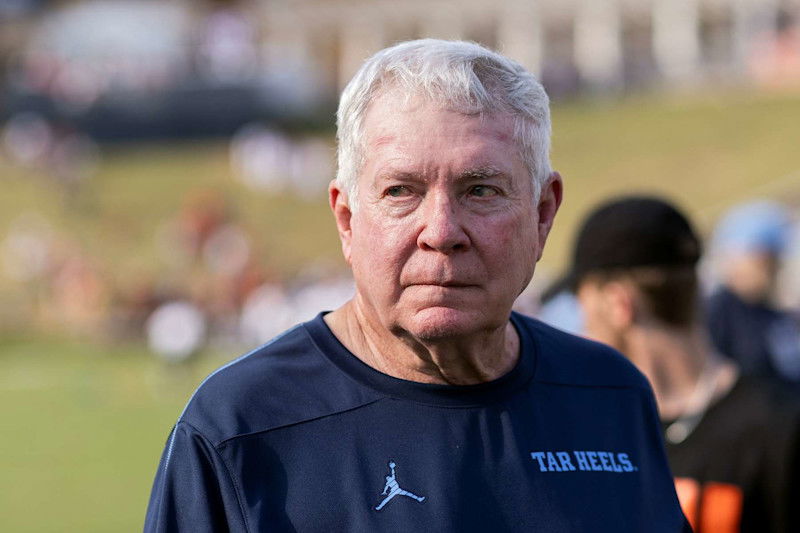

Mack Brown wasn’t just a head coach at UNC; he was a father figure of the program, guiding it from obscurity to national relevance. Honestly, it will be redundant to list his on-field exploits, since his being the winningest coach in UNC’s history is introduction enough for him. What truly set him apart was his remarkable ability to connect with fans, media, and especially players. In a sense, he wasn’t just chasing wins; he was out there to do a cultural overhaul.
Watch What’s Trending Now!
Brown’s first stint in the 1990s turned Kenan Stadium into a spectacle as he drew a jam-packed crowd, revitalizing the program in every aspect. Moreover, in the second stint, having honed his craft at Texas, he brought in lighting up the Blue Bell Tower after every UNC win, which became a powerful symbolic gesture for the fans. Brown sat with David Pollack in his ‘See Ball Get Ball’ podcast’s 10th June episode and talked about how he transformed a player’s life and saved him from committing suicide.
Brown recounted how one of his friends’ 19-year-old son committed suicide, and hearing that, Brown immediately called a meeting at Chapel Hill, addressing any potential mental health issues. “So we sprinted back to Chapel Hill, we called a team meeting and said “Look, I don’t understand suicide, I know it’s not good for parents and for your friends, and it’s I’m not a doctor, so I can’t get into all the stuff, but if you’re struggling, forget football come on man, let’s talk about it let’s get you some help,” Brown recounted. And guess what? One of the players did come forward.
ADVERTISEMENT
Just last year, we saw Brown in a tragic emotional moment when receiver Tylee Craft passed away after fighting a prolonged battle with cancer. The former UNC head coach was visibly agonized and was seen wiping his tears after the Georgia Tech game, after embracing Craft’s mother. This tells how deeply Coach Brown cared for his players. And so when one of his players, Jake Lawler, came forward, Brown went beyond his call of duty.
“We had a young guy named Jake Lawler come upstairs and say: ‘You know I was on a bridge last night, I was thinking about jumping, and you got my attention, and I need help.'” Brown supported him throughout his journey, and now he is thriving as a screenwriter at Disney. “…And here he is, I text with him probably about every two weeks now, and he’s a great screenwriter for Disney, and he’s in a great place,” said Brown.
The incident highlights just how valuable communication can be when you are feeling low. It’s something that should be emphasized with young athletes who have immense pressure to perform with little to less mental health support. Quite recently, we witnessed Kyren Lacy’s tragic death, which reignited those discussions, and Coach Prime even took a meeting addressing the mental health issues in his locker room after the tragedy. So, what can we learn from Mack Brown?
ADVERTISEMENT

ADVERTISEMENT
Honestly, the act by Mack Brown is a testament to how powerful coaches can be in players’ lives. These were the moments that made the head coach come to UNC for his second stint, as he said, “Why did you go back to North Carolina? That’s reason enough right there if you had a small part in changing his life.” While undoubtedly the life-changing act that Mack Brown describes tops the list for Mack Brown, there were other reasons, too, for coming to UNC.
ADVERTISEMENT
Mack Brown told the major reason why he came back to UNC
Mack Brown’s first tenure at UNC was special. The former head coach inherited the program with just one winning season in the prior decade and made UNC a powerhouse from 1988 to 1997. The man led the Tar Heels to consecutive 6 bowl games, a feat never achieved ever since, and finished four 10-win seasons between 1992 to 1997, a monumental feat for a basketball program. However, Brown left the Tar Heels for Texas, where he also won a BCS national championship, and stayed there for 16 years. But when UNC came calling for him in 2019 again? The man could hardly resist.
“We got married there, our kids grew up there; they went to school in North Carolina. So it was a natural when they called us and asked us to come back,” said Brown about his previous deep connection to Chapel Hill. But what stood out to him the most was the challenge of the job. “I like fixing things, and the program was in a mess. They’d won three games two years before, and they’d won two games a year before. Nobody was coming to the games, it was really sad to sit there at ESPN and even watch.”
Top Stories
Greg Biffle’s House Burglary Suspect Identified After Officials Release Security Camera Footage – Report

Scottie Scheffler Injures Fan in the Head at American Express as Painful Moment Is Caught on Camera

‘Hideous’: Jason Day Sparks Outrage With Outfit Choice at PGA Tour Season Debut

Brooke Henderson Ends 10-Year Caddie Partnership With Sister After Major Personal Announcement

Indiana Fever Makes WNBA Announcement on Caitlin Clark’s 24th Birthday

Josh Allen’s Strong Stance on Sean McDermott’s Exit Revealed After Owner Shared Bills QB’s Role in HC’s Firing

Brown came to UNC in 2019 and finally left the seat for Bill Belichick in 2024. In his 6 seasons with the program, he achieved a 44-31 overall record and reached the ACC championship game in 2022, losing to Clemson. His time in his second stint might not be as illustrious as his first, partly because of the changing landscape of CFB with NIL, etc. However, the legacy that Mack Brown has left ranks him as one of the top legends of the game.
ADVERTISEMENT
ADVERTISEMENT
ADVERTISEMENT
ADVERTISEMENT